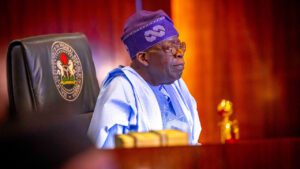Ex-Minister tasks stakeholders on challenges in non-oil sector
Former Minister of State Industry, Trade and Investment, Mrs Aisha Abubakar, has advised stakeholders in the non-oil export value chain on the importance of collaboration to overcome the challenges faced by the sector and ensure its growth.
Abubakar gave the advice at the 2023 National Policy Dialogue on Non-oil Export, organised by Talking Trade and Investment Global, Canada and FemiBoyede Consulting Nigeria Ltd., on Wednesday in Lagos.
According to her, the present moment is the most opportune time for finding solutions to the various challenges faced by Nigeria’s non-oil export sector, both in terms of demand and supply.
She said it is essential to create an enabling environment that facilitates the growth of non-oil exports.
The policy event, in collaboration with the Network of Practicing Non-oil exporters of Nigeria (NPNEN), has the theme, “Prioritising Non-oil Export as a Catalyst for Nigeria’s Economic Revitalisation.”
According to Abubakar, the non-oil export sector holds a veritable solution to the dwindling foreign reserves and the falling value of the nation’s currency, the Nigerian Naira.
“The need to diversify Nigeria’s economy from crude oil, which has remained our major export over the past several decades cannot be overemphasised.
“This is because, especially, at this time when the fuel subsidy removal has plunged many Nigerians into the poverty net, due to unprecedented inflation, and the weakened purchasing power it has brought.
“Our currency is devalued daily, as we have continued to rely heavily on imports, thus, resulting in an imbalance of trade,” she said.
“As of today, the exchange rate is fluctuating between N800 to N1,000 to the dollar, thus influencing the country’s GDP and its level of inflation and interest rates.
“This is coupled with the removal of fuel subsidy, the purchasing power of Nigerian citizens for goods and services has been greatly diminished, plunging more people into the poverty net,” she said.
Abubakar noted that Nigeria needs to deliberately increase its volume of exports to increase its foreign exchange earnings as an urgent strategy for its economic survival.
“This strategy must involve critical stakeholders in the non-oil export value chain playing their roles effectively as state and non-state actors,” she added.
She said it was time to move from aspiration to taking decisive steps toward rebuilding the economy on a more solid foundation, beyond oil.
According to her, economic diversification is no longer an ideal aspirational statement for the Nigerian economy, but rather, an imperative for sustainable economic growth.
Alhaji Ahmed Rabiu, NPNEN President, urged the government to prioritise the development of the non-oil sector by encouraging production and international trade.
He said this would reduce the nation’s reliance on oil exports as it accounted for about 90 per cent of Nigeria’s exports and 60 per cent of the government revenue.
“This makes the country vulnerable to fluctuations in oil prices and global economic shocks. By diversifying its export base, Nigeria can reduce its reliance on oil and make its economy more resilient.
“It will also provide other incentives to businesses in the non-oil sector. This will help to make these businesses more competitive and attract investment,’’ he said.
Mr Femi Boyede of FemiBoyede Consulting Nigeria Ltd., said that Nigeria is currently rated as the largest exporter of solid minerals.
This, he said, was based on statistics from Raw Material Research and Development Council as well as the Federal Ministry of Mines and Steel Development.
According to him, the statistics also shows Nigeria has at least 43 solid minerals that are available in large quantities and large deposits that can be commercially exploited.
He advised that challenges plaguing the non-oil sector be addressed, to allow the country to fully exploit its mineral wealth.




